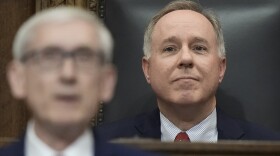Developments in Washington have been coming at a breakneck pace in recent weeks, from the firing of FBI director James Comey to the changing explanations for it, to allegations that President Trump shared classified intelligence with Russian diplomats, to the appointment of a Justice Department special counsel to continue the probe into Russian influence in US electoral politics.
The way it’s been going, there may have been new developments just since the start of this sentence. It's a situation that's reminiscent for many of the Watergate scandal of the early 1970s, and President Richard Nixon.
"Watergate is a turning point. What was generally acceptable in American politics... before then, especially at the national level, has changed significantly since."
"I think it's a good comparison in the sense that there are allegations of serious, criminal wrong-doing that go right to the top in the White House," says Art Cyr, director of the Clausen Center for World Business at Carthage College. "Also, Watergate is a turning point. What was generally acceptable in American politics... before then, especially at the national level, has changed significantly since."
But Cyr also contends the analogy is imperfect. He believes there is an "unholy alliance," between President Trump and the media. He believes Trump has a symbiotic relationship with the press, which feeds his ego while raising profits.
Cyr also notes that unlike President Nixon, Trump does not have a great relationship with his party. "There are a lot of Republicans, I believe, as well as Democrats in Washington - not just in Congress - who'd like to get rid of this guy," says Cyr.
"In that sense the real analogy isn't so much Richard Nixon, who I believe was a significant and certainly durable leader... but Joseph McCarthy."
He continues, "In that sense the real analogy isn't so much Richard Nixon, who I believe was a significant and certainly durable leader - especially in policy terms - but Joseph McCarthy, who dominated American politics in an eerie and very destructive way during the height of the anti-communist hysteria in the late '40s and well into the '50s, and went down very quickly once he got in trouble."
President Nixon was also a vehement anti-communist, who spoke out against the Soviet Union. Unlike previous administrations, the Trump Administration has been surprisingly warm to Russia and many in his cabinet have fostered some form of relationship with the foreign power. Cyr says this is a decided break from most modern Republicans.
"He's not a typical Republican," Cyr explains. "He's an outsider, who came up very quickly, brilliantly in terms of electoral politics, but he does not represent past or present Republican conservatism."






